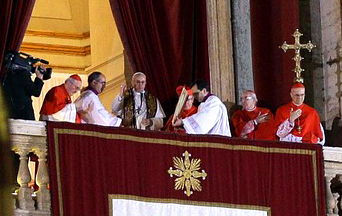
Forty-four years ago, the Brazilian Catholic thinker Plinio Corrêa de Oliveira took a public stand against the Holy See’s policy of détente with the communist governments of the time. He published a statement titled, “The Vatican Policy of Détente with Communist Governments – Should the TFPs Stand Down? Or Should They Resist?”
This public statement was released during the height of the Cold War. Raising a respectful voice of resistance to ecclesiastical authority showed considerable courage and skill.
No one has ever disputed either the legitimacy or the right of faithful Catholics to resist such policies. Indeed, the statement notes that “The Church is not, the Church never was, the Church never will be such a prison for consciences. The bond of obedience to the successor of Peter, which we will never break, which we love in the most profound depths of our soul, and to which we tribute our highest love, this bond we kiss at the very moment in which, overwhelmed with sorrow, we affirm our position.”
10 Razones Por las Cuales el “Matrimonio” Homosexual es Dañino y tiene que Ser Desaprobado
The statement continues by proclaiming “And on our knees, gazing with veneration at the figure of His Holiness Paul VI, we express all our fidelity to him. In this filial act, we say to the Pastor of Pastors: Our soul is yours, our life is yours. Order us to do whatever you wish. Only do not order us to do nothing in face of the assailing red wolf. To this, our conscience is opposed.”
As disciples of the Brazilian Catholic leader, members of the American Society for the Defense of Traditon, Family and Property have taken his filial, sincere, and loyal attitude as a model. They have applied these same principles to the vast range of statements and events that have shaped these five years of Pope Francis’ pontificate, some of which have an even larger scope than the Vatican policies that provoked the original statement.
Eternal and Natural Law: The Foundation of Morals and Law
Thus, the American TFP has joined in supporting a work that analyzes and discerns the limits inherent to pronouncements not covered by the “ex cathedra” formula or that simply do not directly concern the Mission that Jesus entrusted to his apostles.
The abovementioned 1974 statement already highlighted that the assistance assured by the Holy Spirit for the Pope to speak with the privilege of infallibility has well-established limits defined by the First Vatican Council. Beyond those limits, “in certain matters or circumstances, the weakness to which all men are subject can influence and even determine [a Pope’s] performance.”
Based on this decisive premise, the American TFP has welcomed the publication of a book by French TFP member José Antonio Ureta titled, Pope Francis’s “Paradigm Shift”: Continuity or Rupture in the Mission of the Church? An Assessment of His Pontificate’s First Five Years.
Science Confirms: Angels Took the House of Our Lady of Nazareth to Loreto
Based on abundant documentation, the work confirms with words of the Pontiff himself how concepts such as “paradigm shift” and “cultural revolution” are used to define the profound innovations now being introduced. In the wake of such expressions, some theologians and pastors have come to sustain the need to radically rethink the Church in Her structure, doctrine, pastoral praxis, and way of relating to the contemporary world.
This new shift has troubled the consciences of a growing number of Catholics who see the “paradigm shift” as a rupture with the Church’s unchanged teachings and discipline. This concern leads them to ask: Is it legitimate for the faithful in certain circumstances to resist ecclesiastical authority, even that of the Supreme Pontiff? Is it possible that today we find ourselves in a situation analogous to when Saint Paul resisted the first Pope (Gal. 2:11)? This panoramic vision of Francis’ five year pontificate gives readers clear and documented answers to these questions. It analyzes the doctrinal problems involved and the proper response of the faithful.
 Learn All About the Prophecies of Our Lady of Good Success About Our Times
Learn All About the Prophecies of Our Lady of Good Success About Our Times
Both the Chilean-born author and the American TFP have chosen to formulate those answers in harmonious continuity with Plinio Corrêa de Oliveira’s words in 1974: “What, then, should we do? … Church Fathers, Doctors, moralists, and canonists – many of them raised to the honor of the altar – have affirmed the legitimacy of resistance. This genre of resistance is not separation, it is not revolt, it is not acrimony, it is not irreverence. On the contrary, it is fidelity, it is union, it is love, it is submission … Accordingly, in the sense in which Saint Paul resisted, our state is one of resistance.”
The book has been published in Italian and Portuguese. The American TFP will soon be publishing an English edition.
